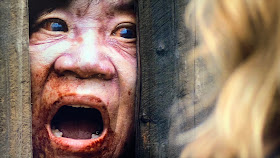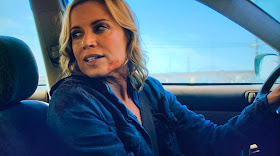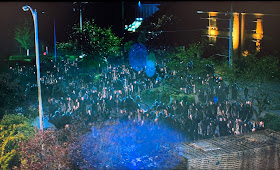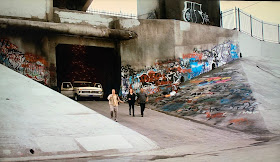"Good people are the first ones to die"
Moving from the gorgeous Georgia backdrops and location shooting that immerses us into the world of The Walking Dead (2010-present), the creators of that series' success turned their eyes and attention to Los Angeles for its first spin off Fear The Walking Dead (2015-present), currently in its sixth season.
The writer for Musings Of A Sci-Fi Fanatic, The Sci-Fi Fanatic himself, has been re-assessing how to write for this blog again in an attempt to restart (though like Duran Duran have I ever really stopped---no). We continue that effort with a season based overview of Fear The Walking Dead (FTWD), the original The Walking Dead's (TWD) sister series.
FTWD has not faired quite as well with the critics as the original. The zombie apocalypse fatigue and the inevitable backlash appears to be rearing its ugly head as viewership on both series appears to be bleeding out the eyeballs. Despite this, the end is near for TWD and FTWD likely won't be that far behind even if they hold their own in quality. They have had excellent runs and for good reason. This science fiction fan is here to tell you both are exceptional and the apocalypse continues to be glorious in terms of evaluating the human condition while delivering on a purely gripping narrative.
Like TWD before it, FTWD introduces us to its characters, essentially three families, via a six (6) episode starter season.
The look and feel of FTWD couldn't be more different than the original and that's a wonderful thing. Even the darker scoring is switched up from the always exceptional Bear McCreary on TWD to Atticus Ross and others for FTWD. Ross often worked with Trent Reznor and became an official member of the band Nine Inch Nails. He's a good choice for the brief theme track.
Whereby TWD assembles its disparate cast members into a functioning makeshift family unit surviving the wilds of zombies and human behavior in Woodbury, Georgia or Terminus, FTWD assembles its more traditional, nuclear, often dysfunctional, family approach for the start of FTWD. This makes perfect sense. The family is a subjective concept in all of television's landscape, but here it begins by hanging onto the symbol of a healthy civilization and clinging to it for fear of being ripped apart as the zombie apocalypse steps in as a symbol of a rotting society and culture. A drug flop house couldn't be more symbolic of a world that has lost its way and attempts to cling to order and normality. This is a fitting landscape to mirror our current state of affairs culturally.
TWD dropped us into the middle of the full blown zombie apocalypse in Season One and seem to merely tantalize us with life before the apocalypse throughout with brief flashbacks. FTWD literally places us at the very beginning of the zombie outbreak. We are dropped in with its ensemble cast to watch and experience it unfold gradually before our very eyes.
Like its parent series FTWD is populated by a variety of strong characters, if arguably not quite as memorable. Still, the series' ordinary people are plunged headlong into a nightmare and they reflect behavior relative to our own on coping with the unknown happening before them. Unlike Rick Grimes and the folks in GA, the first season of FTWD is less concerned with plunging knives into zombie skulls, then it is with being confused, perplexed and trying feverishly to come to terms with what is happening and what to make of it all. This may not be a new idea, but FTWD spreads out the concept across six strong episodes and lets things happen slowly for a riveting, dramatically powerful, grim, nail-biting approach.
FTWD Season One is arguably as strong as TWD's first season or at least it comes close. They are both essential and yet both are radically different. This is a refreshing and welcome offshoot at least in the beginning here. At some point you have to find ways to survive as things get worse and reality sets in and these characters no doubt will.
TWD considers rather brilliantly how humanity would choose to reassemble civilization. It asks us who we are and who we would allow to govern that new world. It makes us look in the mirror. It sees humanity often at its worst and conditioned response as something radically different from what once was. FTWD is simply caught up in ordinary, every day human behavior, however trivial, while in effect attempting to deny the impact of something very big on the verge. The human mind is a powerful survival device. People are putting out rubbish curbside while infected neighbors are literally attacking in unexplained (at this point) random acts of violence. Things are unfolding but nothing is understood and the human psychology can't wrap its head around it. It's all very effective. The creative voice for FTWD is quite unique from its parent and this is always welcome in a new enterprise within a growing franchise (The Walking Dead: World Beyond is another story for another day).
Our own imagined human responses are captured quite eloquently through two paternal figureheads from two families with two opposing world views. One is the liberal dreamer, a teacher, incensed by guns and violence, while the other embraces knowing how to use a gun and being prepared. One is hawkishly practical while the other is in a sense deceiving himself to the unfolding realities. Cliff Curtis, Ruben Blades, Kim Dickens and Frank Dillane are true highlights in the series at least for its Season One debut. The Curtis character tries to assuage his family's fears by telling them everything will "be better now" following the arrival of the military. But he's lying to himself and he knows it. He's clinging to the hope of civilization standing. Conversely, the Blades character is a pragmatist and understands the grim reality before them and utters "it's already too late."
FTWD focuses on the intimate through a handful of families and characters against the immense and epic backdrop that is the scope of Los Angeles ( a fantastically radical CA setting and distinguishing itself from its GA counterpart) and it does so meticulously. The dissolution of civilization to a virus is executed gradually, credibly, powerfully and it is riveting to watch it unravel. We are with these people.
After all the titular TWD is never truly about zombies, it's about us. It's about the people. It's about the survivors and putting it all back together. FTWD is the dissolution of civilization whereby TWD seeks to rebuild it in some form. It's the evil men do that we need to fear and thus the titular FTWD is about fearing us. In both series we are the walking dead in our own right.
FTWD may not be the near perfect classic season one spawn of the original from which its carved but its close. It starts stronger than it ends, but it has this fanatic's attention. It's also a dark, creepy takeover alternative to the kind of energized suspense of the excellent Netflix entry Black Summer (2019-). But honestly when they are this good there is room for all.
FTWD is unnerving, unsettling, infectious stuff immersed within a grim, despairing atmosphere. Like the original it is both epic and intensely intimate and personal in all the right places and in all the right moments exactly how we love The Walking Dead. Essential.















































No comments:
Post a Comment